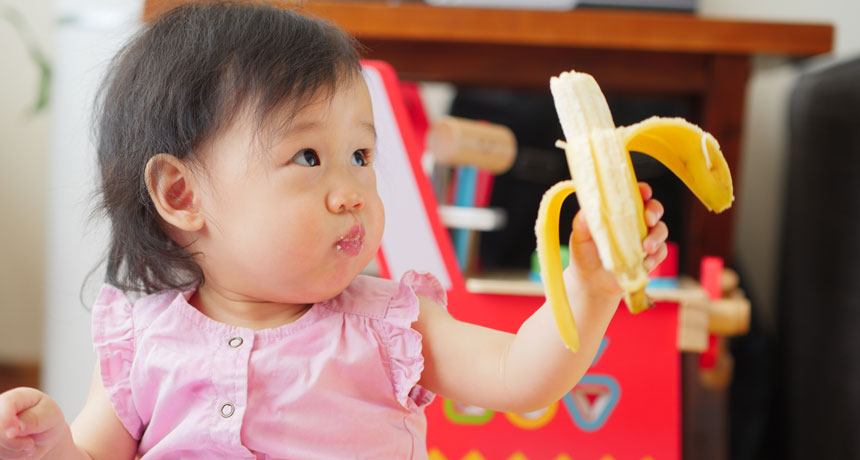Baby-led weaning won’t necessarily ward off extra weight
Babies who fed themselves gained similar amounts of weight as spoon-fed babies

Letting babies feed themselves may not prevent them from putting on extra weight. But it sure is fun to watch.
M-image/istockphoto
When my younger daughter was around 6 months old, we gave her mashed up prune. She grimaced and shivered a little, appearing to be absolutely disgusted. But then she grunted and reached for more.
Most babies are ready for solid food around 6 months of age, and feeding them can be fun. One of the more entertaining approaches does not involve a spoon. Called baby-led weaning, it involves allowing babies to feed themselves appropriate foods.
Proponents of the approach say that babies become more skilled eaters when allowed to explore on their own. They’re in charge of getting food into their own mouths, gumming it and swallowing it down — all skills that require muscle coordination. When the right foods are provided (yes to soft steamed broccoli; no to whole grapes), babies who feed themselves are no more likely to choke than their spoon-fed peers.
Some baby-led weaning proponents also suspected that the method might ward off obesity, and a small study suggested as much. The idea is that babies allowed to feed themselves might better learn how to regulate their food intake, letting hunger and fullness guide them to a reasonable calorie count. But a new study that looked at the BMIs of babies who fed themselves and those who didn’t found that babies grew similarly with either eating style.
A clinical trial of about 200 mother-baby pairs in New Zealand tracked two different approaches to eating and their impact on weight. Half of the moms were instructed to feed their babies as they normally would, which for most meant spoon-feeding their babies purees, at least early on. The other half was instructed that only breast milk or formula was best until 6 months of age, and after that, babies could be encouraged to feed themselves. These mothers also received breastfeeding support.
At the 1- and 2-year marks, the babies’ average BMI z-scores were similar, regardless of feeding method, researchers report July 10 in JAMA Pediatrics. (A BMI z-score takes age and sex into account.) And baby-led weaning actually produced slightly more overweight babies than the other approaches, but not enough to be meaningful. At age 2, 10.3 percent of baby-led weaning babies were considered overweight and 6.4 percent of traditionally-fed babies were overweight. The two groups of babies seemed to take in about the same energy from food, analyses of the nutritional value and amount of food eaten revealed.
The trial found a few other differences between the two groups. Babies who did baby-led weaning exclusively breastfed for longer, a median of about 22 weeks. Babies in the other group were exclusively breastfed for a median of about 17 weeks. Babies in the baby-led weaning group were also more likely to have held off on solid food until 6 months of age.
While baby-led weaning may not protect babies against being overweight, the study did uncover a few perks of the approach. Parents reported that babies who fed themselves seemed less fussy about foods. These babies also reportedly enjoyed eating more (though my daughter’s prune fake-out face is evidence that babies’ inner opinions can be hard to read). Even so, these data seem to point toward a more positive experience all around when using the baby-led weaning approach. That’s ideal for both experience-hungry babies and the parents who get to savor watching them eat.







